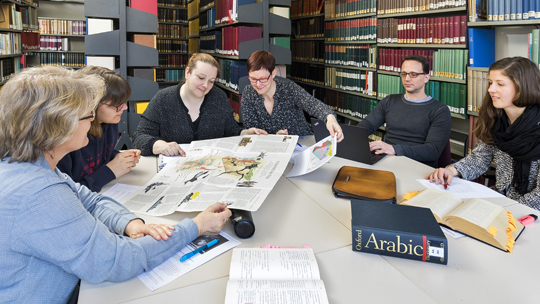Decoding Dissonant Voices
Freiburg, Mar 28, 2017
What is being written in newspapers in Turkey and Lebanon about the war in Syria? How do they present the refugees' situation or the foreign policy interests of the countries involved? Islamic studies' students at the University Freiburg have been addressing these questions in a special seminar. They are translating articles from Turkish and Arabic, analyzing the respective media landscapes, and have written comprehensive commentaries on what they have found. The results are now available on the seminar's own website.
 Commentaries on the war: Students work with professors Johanna Pink and Ruth Bartholomä to translate and analyze reports on the war in Syria and the Kurdish conflict.
Commentaries on the war: Students work with professors Johanna Pink and Ruth Bartholomä to translate and analyze reports on the war in Syria and the Kurdish conflict.
Photo: Jürgen Gocke
The lede sentence from one Arabic newspaper already posed a challenge: "A row of yellow crates on the way to burial" is a reminder for Iran and its militias in Syria of how it is without Russian support. Maren Bagdahn first translated the sentence word-for-word. But what could "yellow crates" mean? Bagdahn researched the topic and in the final version of her translation chose "a row of coffins." In a footnote she explained that the linguistic image in the source text referred to yellow Hezbollah flags covering fighters' coffins.
"My goal was to produce a German text that reads well," said Bagdahn, a Master's student of Islamic studies at the University of Freiburg. The article from the Lebanese newspaper Al-Mustaqbal was an editorial that was critical of Iran. Bagdahn's translation and a detailed commentary for it can now be read on a website. Bagdahn says, "The comments classify linguistic features and allusions and explain the topic's context."
Political relevance
The website resulted from a seminar that took place during the summer semester of 2016. Entitled "The War in Syria from an Arabic and Turkish Perspective," it was aimed at advanced Bachelor's and Master's students. "We always try to work with original language sources," says Johanna Pink, a professor of Islamic studies of the Oriental Seminar of the University of Freiburg. She explains, "In this seminar, we also wanted to offer an actual, politically relevant issue."
Pink and her colleague, junior professor Ruth Bartholomä, then put their heads together and decided that seminar results were to be published on the Internet. They entered their concept in the "Innovative Studies" project competition of the Freiburg student government (StuRa) and won. This provided additional financing for research assistant Olmo Gölz, who supported the students in preparing their work for the website. Pink says, "We wanted it to become something that the public could read rather than just one or two lecturers. Tutors who were native-speakers of Arabic and Turkish also assisted with the seminar.
Searching, finding and selecting
"Our initial question was 'How do countries where many refugees live and that are geographically much closer than we are to the Syrian war report on it?'" says Bartholomä. The seminar's 17 participants spent their first sessions becoming familiar with the media landscapes in Lebanon and Turkey, and the fundamentals of the conflict in Syria.
They then went on to search for and select the newspaper articles that they wanted to translate and comment on. Says Pink, "We consciously let the students choose." She adds that the research done on Lebanese and Turkish media websites was not exactly easy. Master's student Nina Schad explains, "I found searching for Arabic sources quite challenging." She chose an article from the Lebanese newspaper, An-Nahār about the role of the European Union.
The topics ranged from the handling of refugees to the Kurdish conflict to the use of poison gas in the Syrian war. The original texts are linked to the now finished website, which includes a translation, short abstract, detailed commentary, summary and bibliographical references for each article. Gölz and the students edited the final versions of the texts together.
"We discussed the first drafts of the translations together in the seminar sessions," says Bartholomä, "and the tutorials were important as well." She added that some of the Bachelor's students had completed only one year of language instruction, so it was a big leap for them to translate a text that read well. The commentaries were prepared during the semester break.
Applying everything
"You can work for half an hour to translate a long Turkish sentence," confirmed Kirsten Kreher. The Bachelor's student translated an article about deaths among Syrian asylum seekers that appeared in the Turkish opposition newspaper Evrensel. She went on to say classifying the article was also labor intensive, but very exciting. "We analyzed freedom of the press in Turkey, for example, and we asked ourselves which sources were named and how we could determine if they were reliable," Kreher says.
According to Pink, a seminar like this one was certainly more time consuming than the average course for teachers and students alike. Nevertheless, she added, she would like to do another one like it at the next opportunity. Kreher summed up, saying it was worth it. "For me it was the seminar for which I could apply everything that I have learned up to now."
Thomas Goebel
To read the translations and commentaries please see the website

